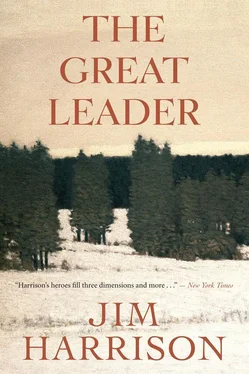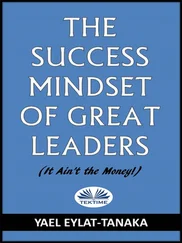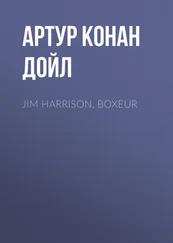Jim Harrison - The Great Leader
Здесь есть возможность читать онлайн «Jim Harrison - The Great Leader» весь текст электронной книги совершенно бесплатно (целиком полную версию без сокращений). В некоторых случаях можно слушать аудио, скачать через торрент в формате fb2 и присутствует краткое содержание. Жанр: Триллер, на английском языке. Описание произведения, (предисловие) а так же отзывы посетителей доступны на портале библиотеки ЛибКат.
- Название:The Great Leader
- Автор:
- Жанр:
- Год:неизвестен
- ISBN:нет данных
- Рейтинг книги:3 / 5. Голосов: 1
-
Избранное:Добавить в избранное
- Отзывы:
-
Ваша оценка:
- 60
- 1
- 2
- 3
- 4
- 5
The Great Leader: краткое содержание, описание и аннотация
Предлагаем к чтению аннотацию, описание, краткое содержание или предисловие (зависит от того, что написал сам автор книги «The Great Leader»). Если вы не нашли необходимую информацию о книге — напишите в комментариях, мы постараемся отыскать её.
The Great Leader — читать онлайн бесплатно полную книгу (весь текст) целиком
Ниже представлен текст книги, разбитый по страницам. Система сохранения места последней прочитанной страницы, позволяет с удобством читать онлайн бесплатно книгу «The Great Leader», без необходимости каждый раз заново искать на чём Вы остановились. Поставьте закладку, и сможете в любой момент перейти на страницу, на которой закончили чтение.
Интервал:
Закладка:
“From what I heard in e-mail and on the phone you were behind her in plain view.” His mom was smug with self-righteousness.
“The night was black and cold and snowing. No one could see a thing. I was carried away with passion.” Sunderson had decided that a strong offensive was best and could see that his mother had become doubtful in her attack posture.
“We’re having your favorite chicken and biscuits,” Berenice interrupted.
“Darrell Waltrip is kicking ass,” Bob said, turning from his NASCAR event on the television, then noticing Sunderson. “There’s room for you in the company,” he added.
Sunderson sat down beside his mother and took her stiff hand. She turned away, still unwilling to let him off the hook.
“I e-mailed Diane and you can tell she’s upset about your behavior.”
Sunderson tried to imagine the language his mother had used to describe his behavior to Diane, and then Diane’s trilling laughter when she read the e-mail. Berenice brought him a stiff whiskey on the rocks for which he was grateful. He spilled a little when Bob bellowed, “Waltrip won!”
Sunderson ate too much of the stewed chicken and biscuits but then so did everyone else. His mother dozed off at the table after her last bite of lemon meringue pie. Looking at her he dwelt on the mystery of her giving birth to him sixty-five years before.
“She’s not doing too well. Her heart is weak,” Berenice said, clearing the table. “And you look like you could use a vacation. Couldn’t you go fishing someplace down in Mexico?”
“He could start work tomorrow,” Bob piped up, finishing his second piece of pie and rubbing his tummy as if he had accomplished something noteworthy.
He had left his cell phone in the car and noted that Diane had called for “no reason,” or so she said in her message. He called back before he got on the freeway back to Tucson. While they talked he watched an octogenarian shuffling down the street with his walker. Sunderson resolved to shoot himself in the head before he would live in a retirement colony. Diane joked about his “scandalous missteps” with Carla. She had always been amused rather than judgmental about human foibles, but then her voice weakened and she said that two days before her husband had been diagnosed with liver cancer. Since he was a doctor himself he had become immediately depressed about the inevitable prognosis. “I’m so sorry,” Sunderson offered. “Things had been going so well,” she said before hanging up. She had only been married half a year.
Heading north on the freeway he saw clearly again that like so many his marriage, the central fact of his life, had failed because the marriage and the job didn’t go together, couldn’t coalesce, couldn’t coexist in a comfortable manner. The simple fact was that when you worked all day monitoring the least attractive behavior of the species you’re going to carry the job home. Diane, a very bright woman indeed, couldn’t believe in the fact of evil, which always reminded him of Anne Frank’s deranged statement that people were essentially good. If you’re a cop long enough even songbirds are under suspicion. The daily involvement with minor league mayhem did not predispose one to large thoughts. His brain short-circuited again. His unused first name, Simon, only served to remind him of the Mother Goose verse, “Simple Simon met a pieman going to the fair.” He signed his name S. Sunderson and no one he knew had the guts to call him Simon, except his mother. In his childhood any grade school boy that used Simon got his ass kicked while the girls tortured this sore point as did his sisters Berenice and Roberta. The family called Roberta “Bertie” because of the eccentricity of his parents calling the little brother Robert who had been the family’s long-term headache until he died of heroin in Detroit where he was the soundman for a Motown band. When Robert was a boy he’d had a terrible accident at the big saw at the pulp mill and Sunderson and the rest had all stood in a circle looking at Robert’s lower leg on the railroad siding. When the ambulance came the driver put the appendage in a small burlap bag. This item was large in Sunderson’s accretion of emotional mold.
When he reached the Arizona Inn in the twilight he saw that Diane’s near doppelganger was sitting near the vacant Ping-Pong table under the smoking cupola. He barely had the courage but joined her and was rewarded with a broad smile. This made him happily nervous so he lit a cigarette. To his surprise she lit one of her own.
“I rarely smoke but at dinner I had an argument with my mother. I’m fifty-five and she’s eighty but she tried to make me eat my spinach.” She laughed at the absurdity.
“I had an argument with mine, too,” he admitted.
“About what?”
“I misbehaved at my retirement party in the Upper Peninsula of Michigan and the news reached her by phone and e-mail all the way out here.”
“What did you do?”
“It’s too indelicate to admit.” He felt himself blush.
“Please. I’m an Episcopalian but I’m an adult. I want to hear some naughty talk,” she laughed.
“I sort of made love to a dancing girl out by a woodpile. There were witnesses looking out the window of the cabin.” He was pained to admit this but he liked the fullness of the laughter that ensued.
“You sort of made love! What did your mother say?”
“She said shame on you son.”
More laughter and Sunderson leafed through a large book she was looking at. It was a coffee table book about petroglyphs in the Southwest.
“That’s wonderful. My name’s Lucy. My mother served spinach, a vegetable I hate, at my birthday dinner. Maybe you’re like Kokopele, a mythic Indian with a fondness for ladies?” She showed him a petroglyph of Kokopele, the humpbacked flute player. The light was growing dim and she invited him to join her for coffee and a brandy. He followed her on a longish walk through gardens past rooms and bungalows a little worried that he wouldn’t find his way back to his room, which he saw as a deliciously childish worry.
“Keep your hands off, buster. I’m happily married,” she said at the door.
“I’m not happily divorced,” he replied.
He wondered where her bed was because he was standing in an elegant living room with a couple of Chinese screens while she called room service. He had never felt so far away from the Upper Peninsula except maybe at a Frankfurt whorehouse forty years before.
“My parents were friends of the owner and used to stay here so my dad reserves the same room for me.”
They sat at a table slowly turning the pages of the petroglyph book. He had seen a similar book at Marion’s house but had never bothered taking a look. When the room service waiter came he called her “Mrs. Caulkins.” Sunderson noted her conversation style was very much like Diane’s, light and deferential with an occasional edge of the abrasive. She spoke of the drawings on stone as the “roots of religion,” also “totemistic,” a word Marion used. She drank her large brandy more quickly than he did.
“My mother is making me gulp. Why are you on edge?”
“I didn’t think it showed.”
“It does. You’re like my husband when he heard he was going to be audited by the IRS.”
“I retired two days ago and I already feel a little useless.” He was hesitant at first but then went ahead and explained his recent life including the Great Leader, Dwight. With a bit of probing on her part he added the reasons for the divorce.
“I’ve seen that a half dozen times. A couple begins quite romantically doing a lot of things together and then it begins to die if the man becomes overabsorbed in his work. It can go the other way. A friend of mine started working in an animal shelter and found it more interesting than taking care of her husband who was anyway less than fascinating. Another friend saw her kids off to college and then went back to finishing her nursing degree. Now she’s a surgical nurse and lives in New York City and her husband is still down the road from us in Bedford wondering what hit him.”
Читать дальшеИнтервал:
Закладка:
Похожие книги на «The Great Leader»
Представляем Вашему вниманию похожие книги на «The Great Leader» списком для выбора. Мы отобрали схожую по названию и смыслу литературу в надежде предоставить читателям больше вариантов отыскать новые, интересные, ещё непрочитанные произведения.
Обсуждение, отзывы о книге «The Great Leader» и просто собственные мнения читателей. Оставьте ваши комментарии, напишите, что Вы думаете о произведении, его смысле или главных героях. Укажите что конкретно понравилось, а что нет, и почему Вы так считаете.












